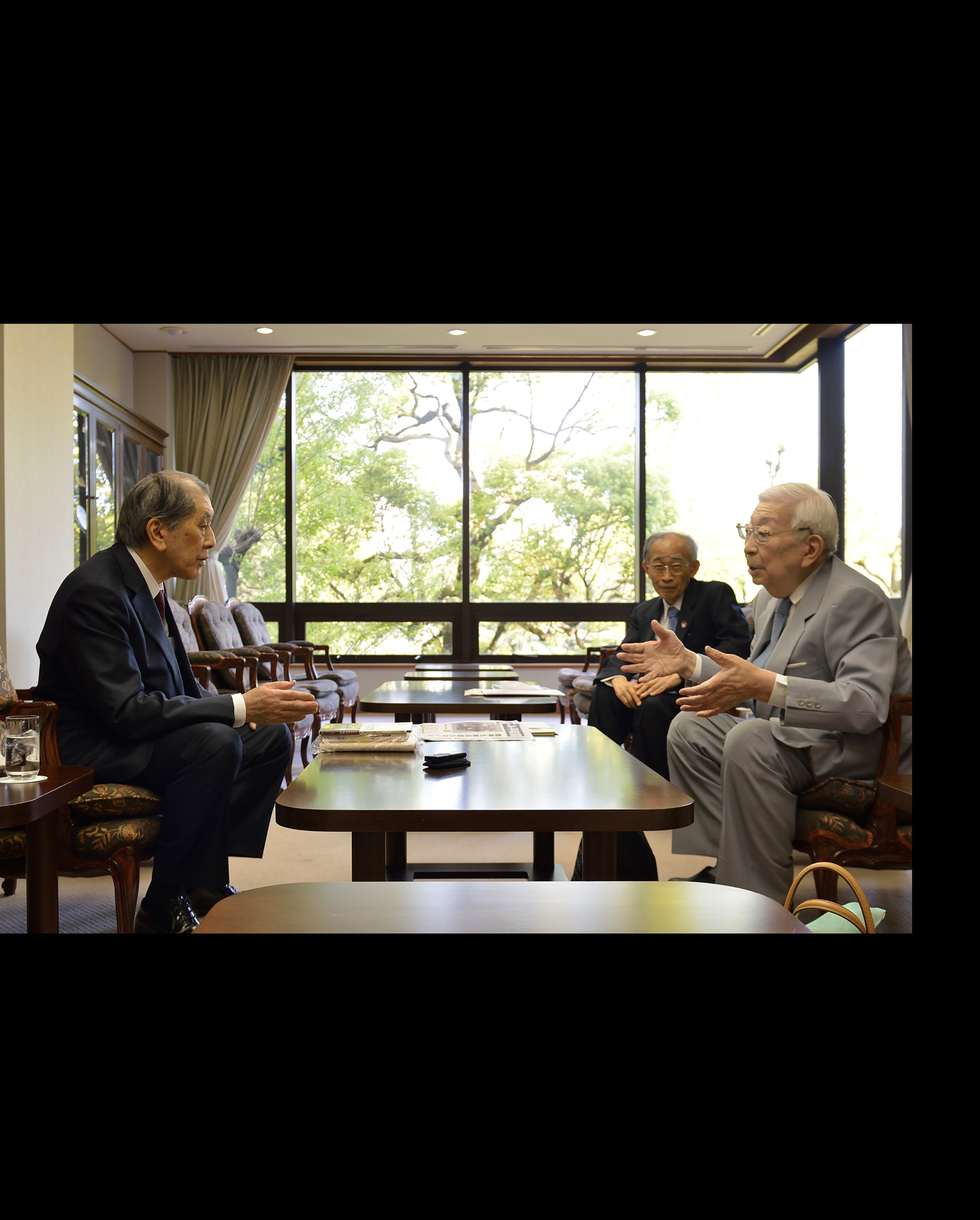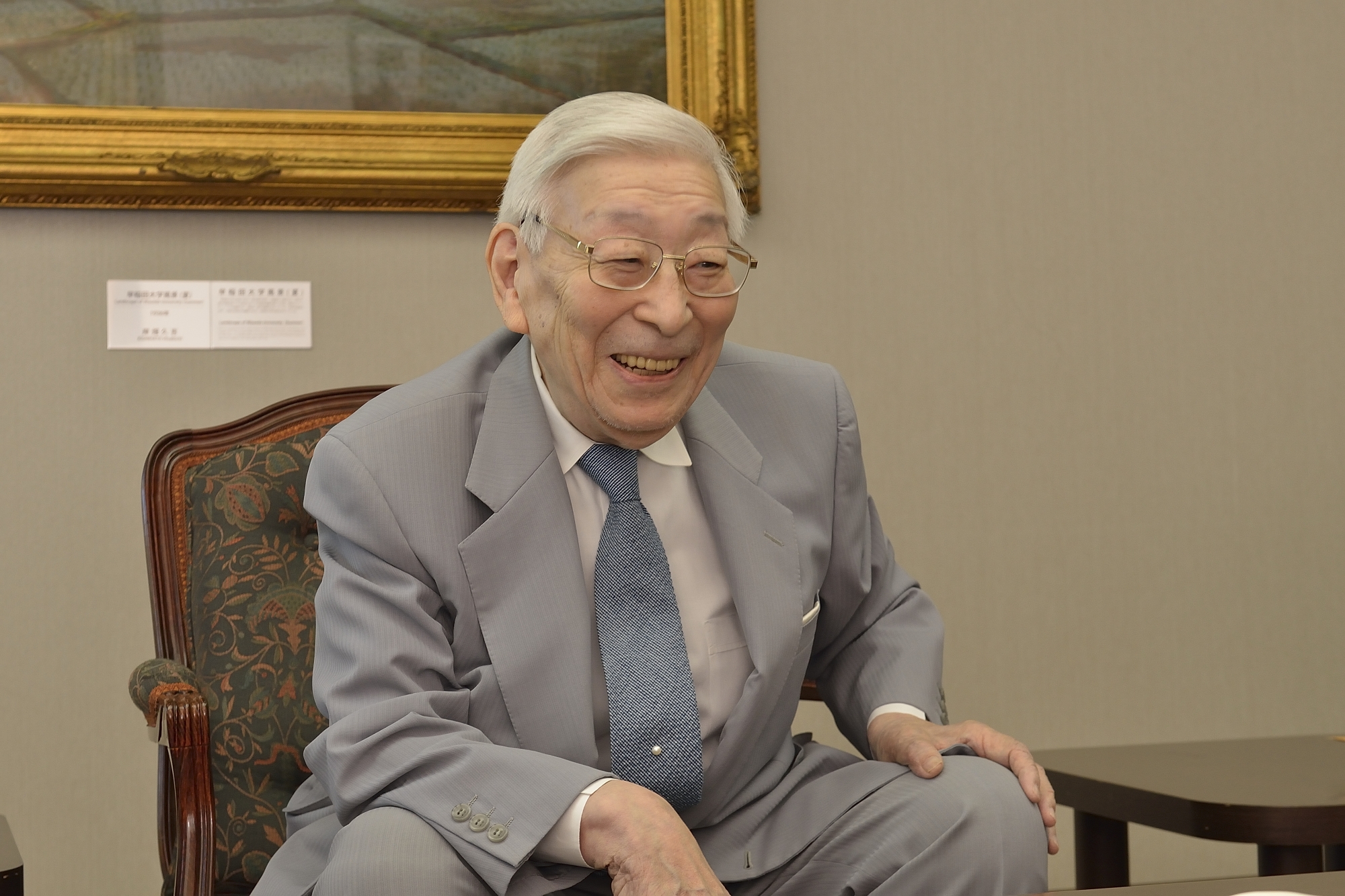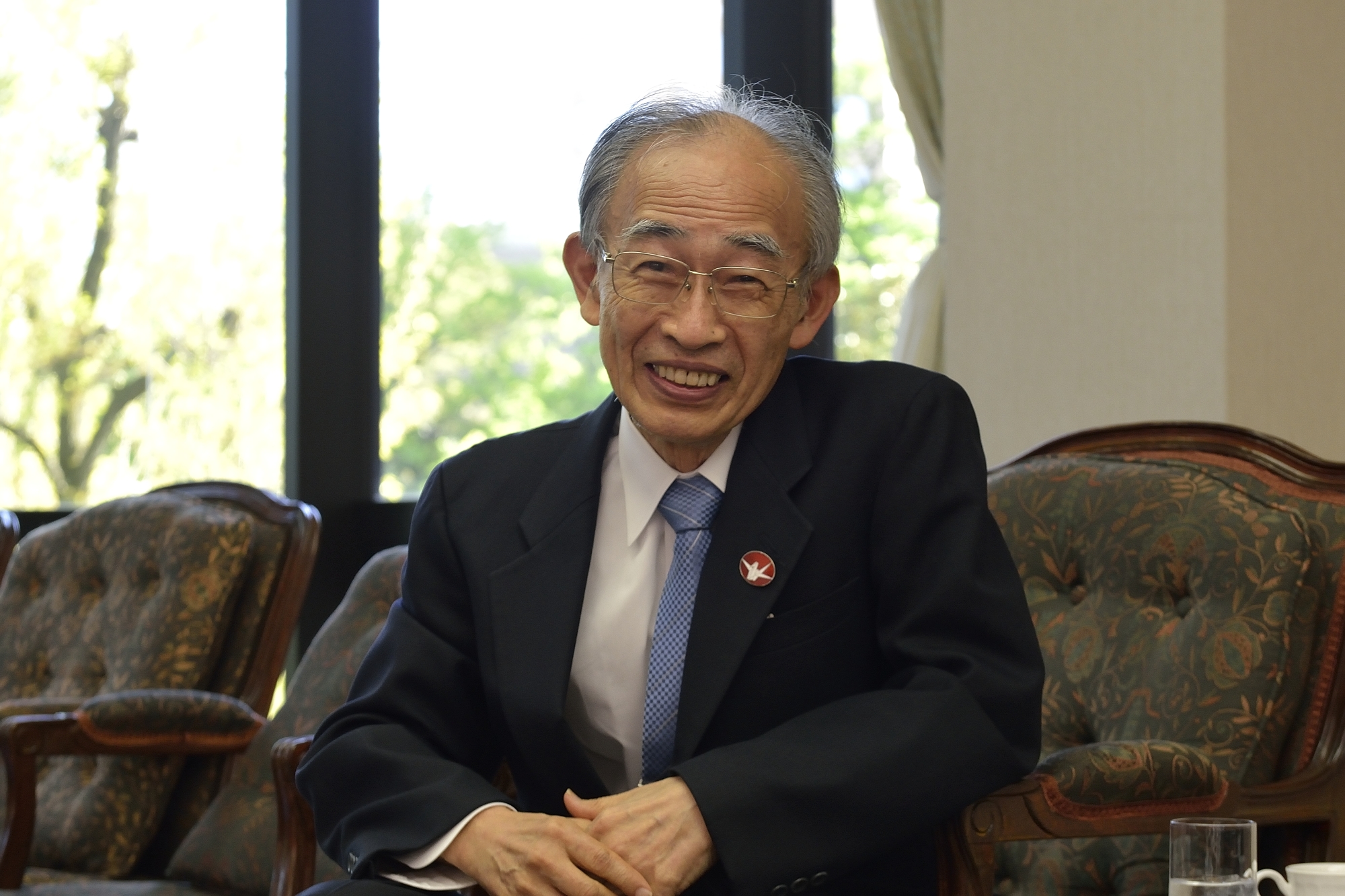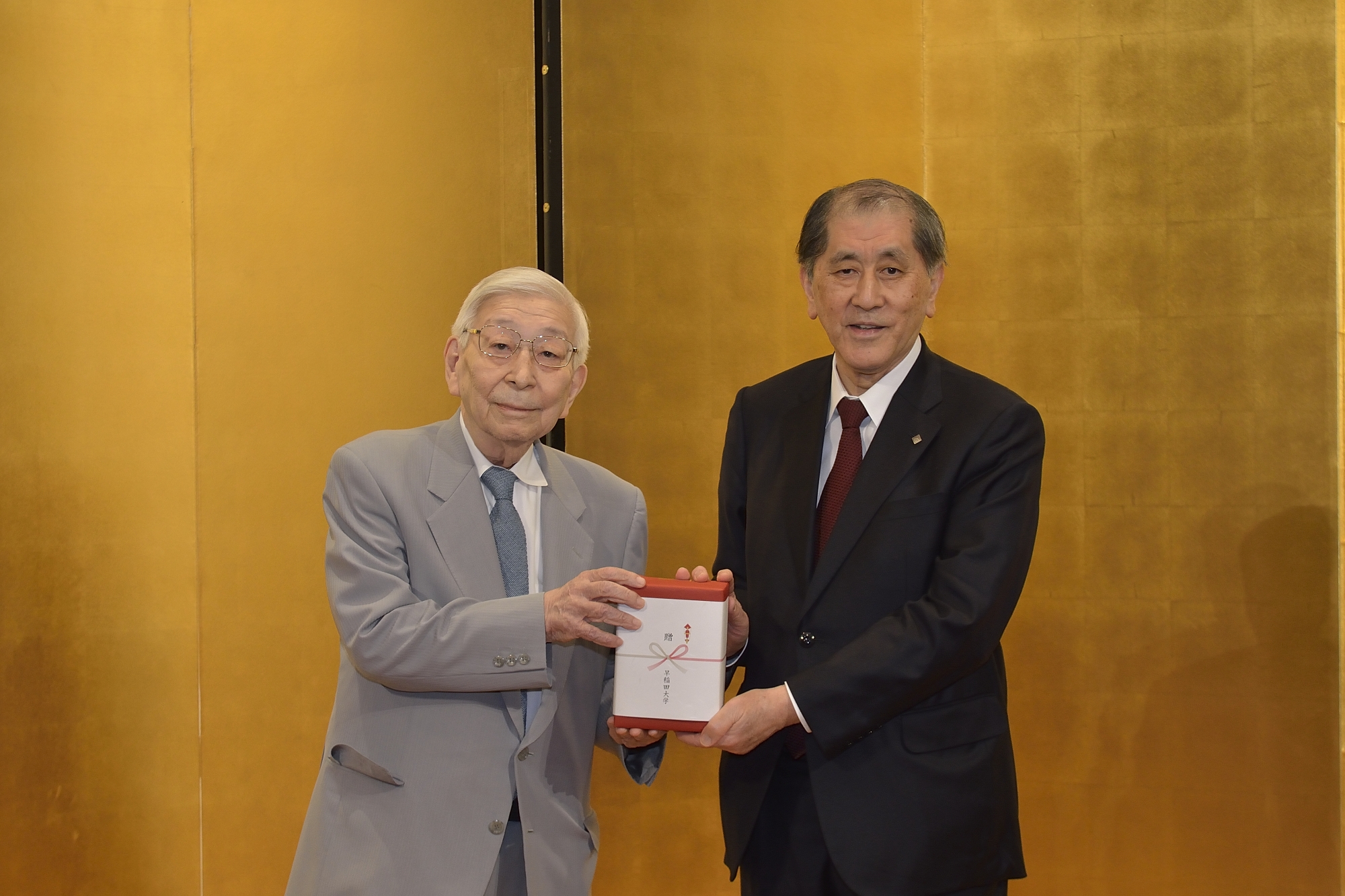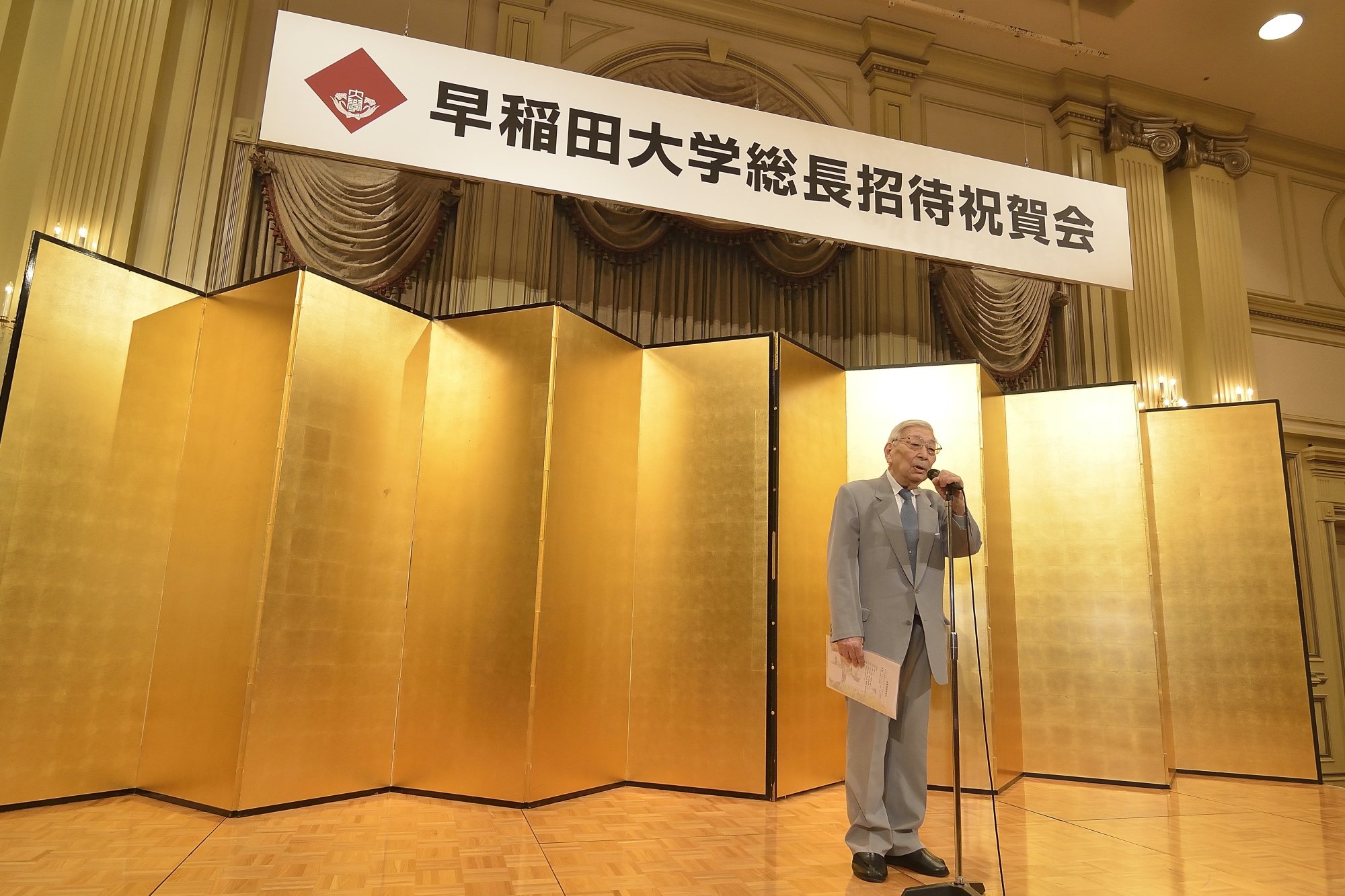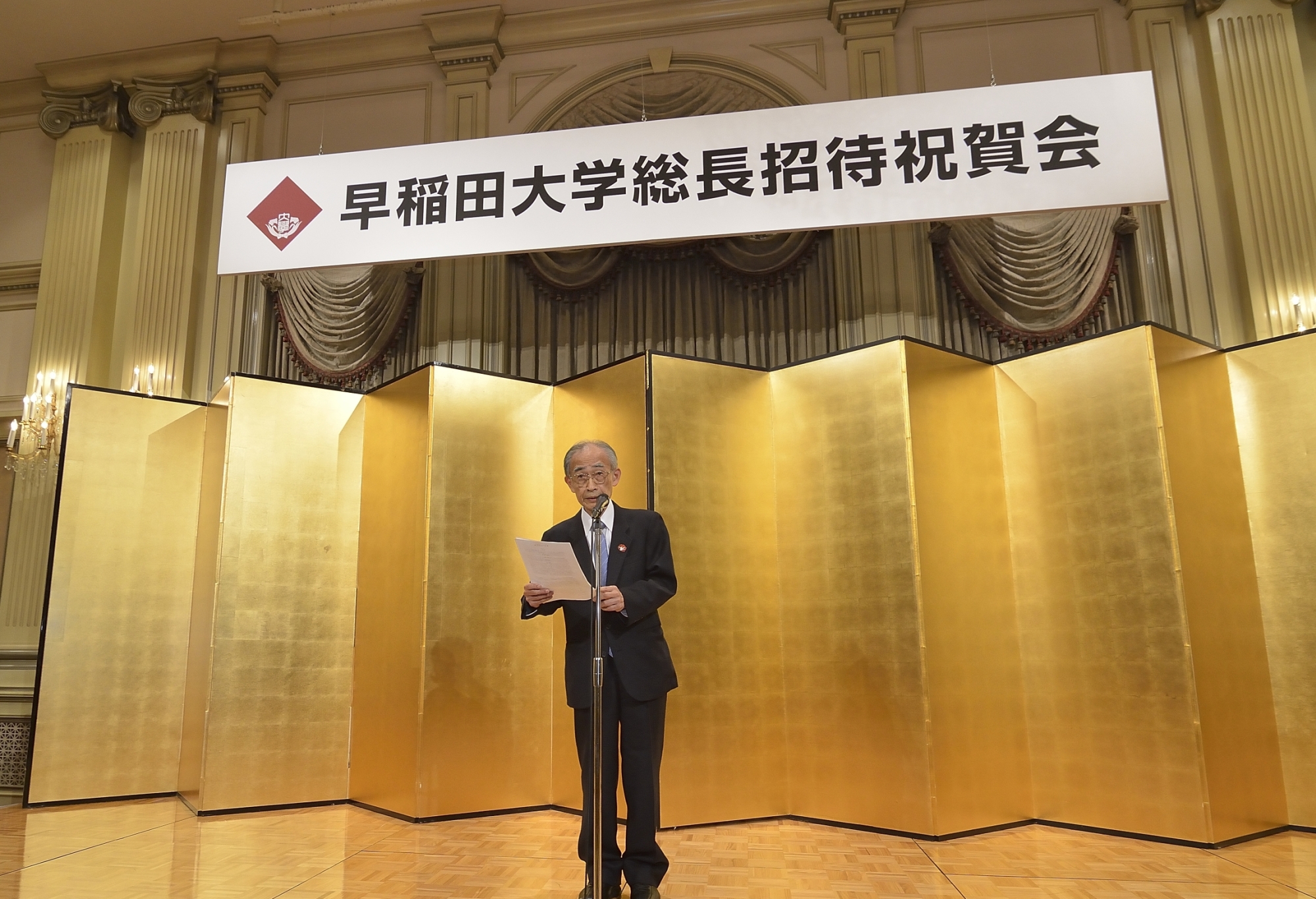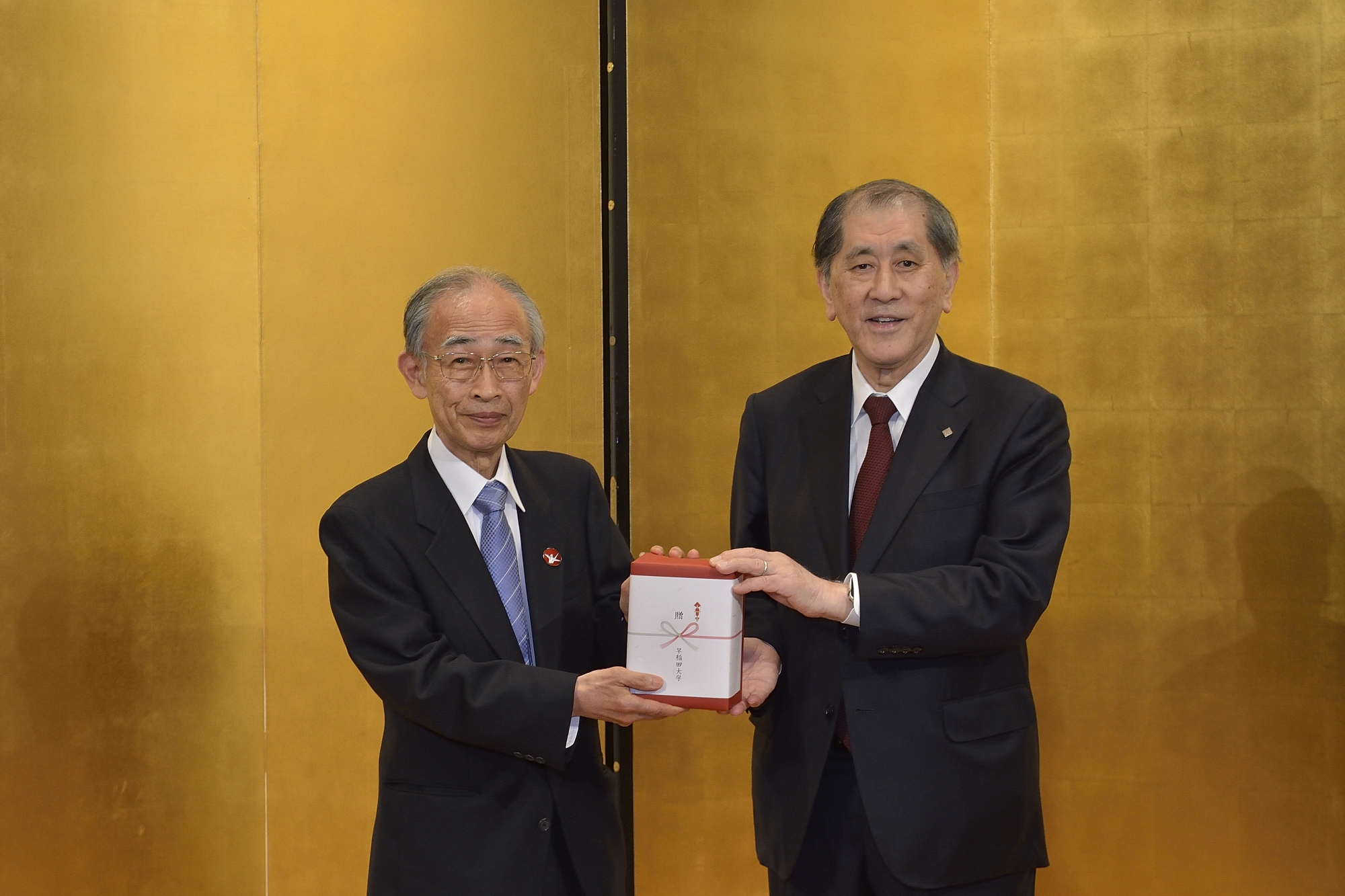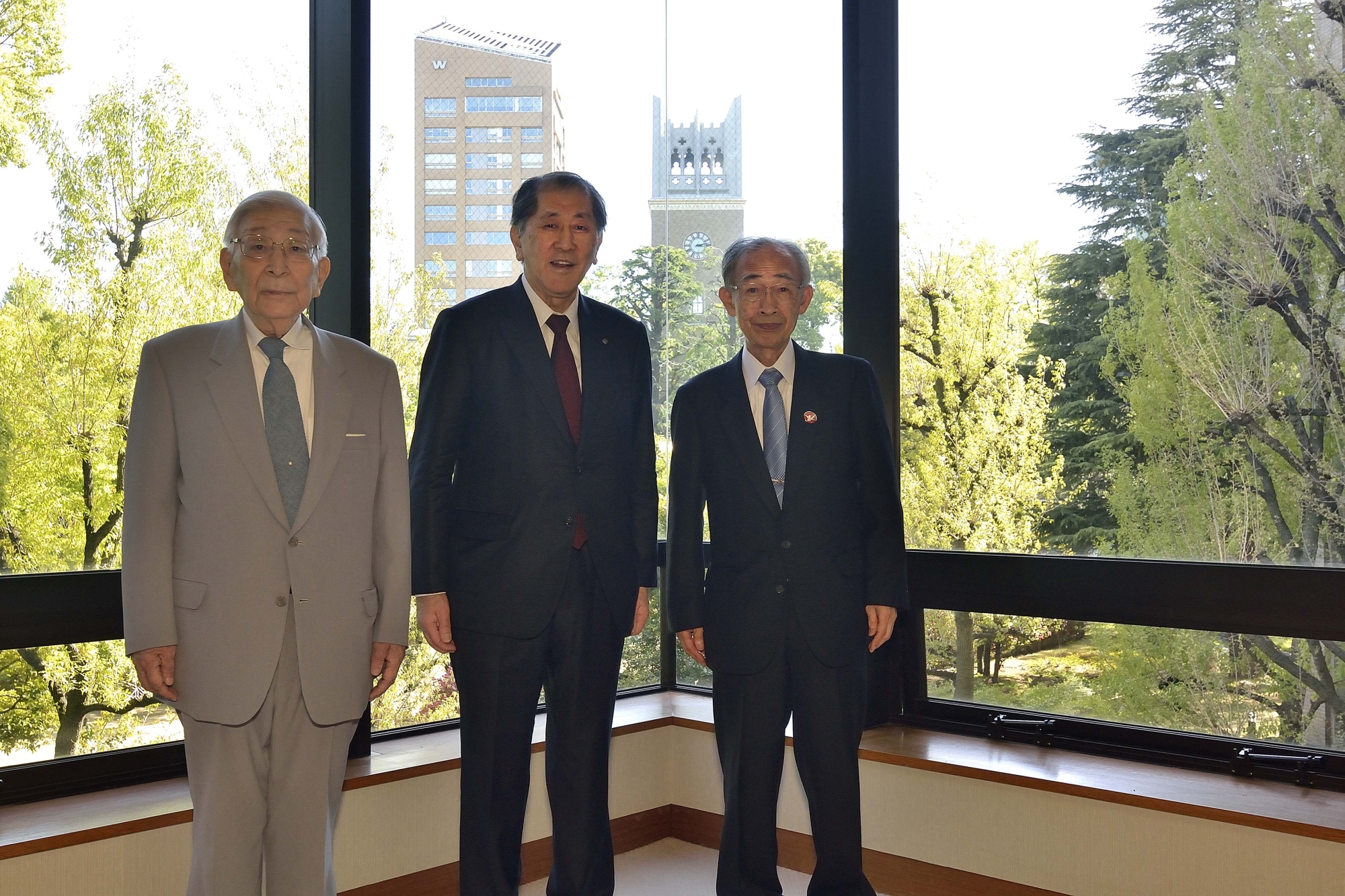- Featured Article
Two Nobel Prize Winners From Hidankyo Visit Waseda
Thu 24 Apr 25
Thu 24 Apr 25
Passing on the experience of the atomic bombing to the next generation
On April 15, 2025, Nobel Peace Prize laureate Nihon Hidankyo (Japan Confederation of A- and H-Bomb Sufferers Organizations) Representative Director Satoshi Tanaka (1967 graduate of the School of Political Science and Economics I) and Assistant General Secretary Jiro Hamasumi (1969 graduate of the School of Political Science and Economics I /1971 graduate of the School of Education) visited Waseda University. They gave speeches at the President's Invitational Celebration held at the Rihga Royal Hotel Tokyo on the same day. This article provides a report on the day.
*The remarks of each speaker are excerpts or summaries.
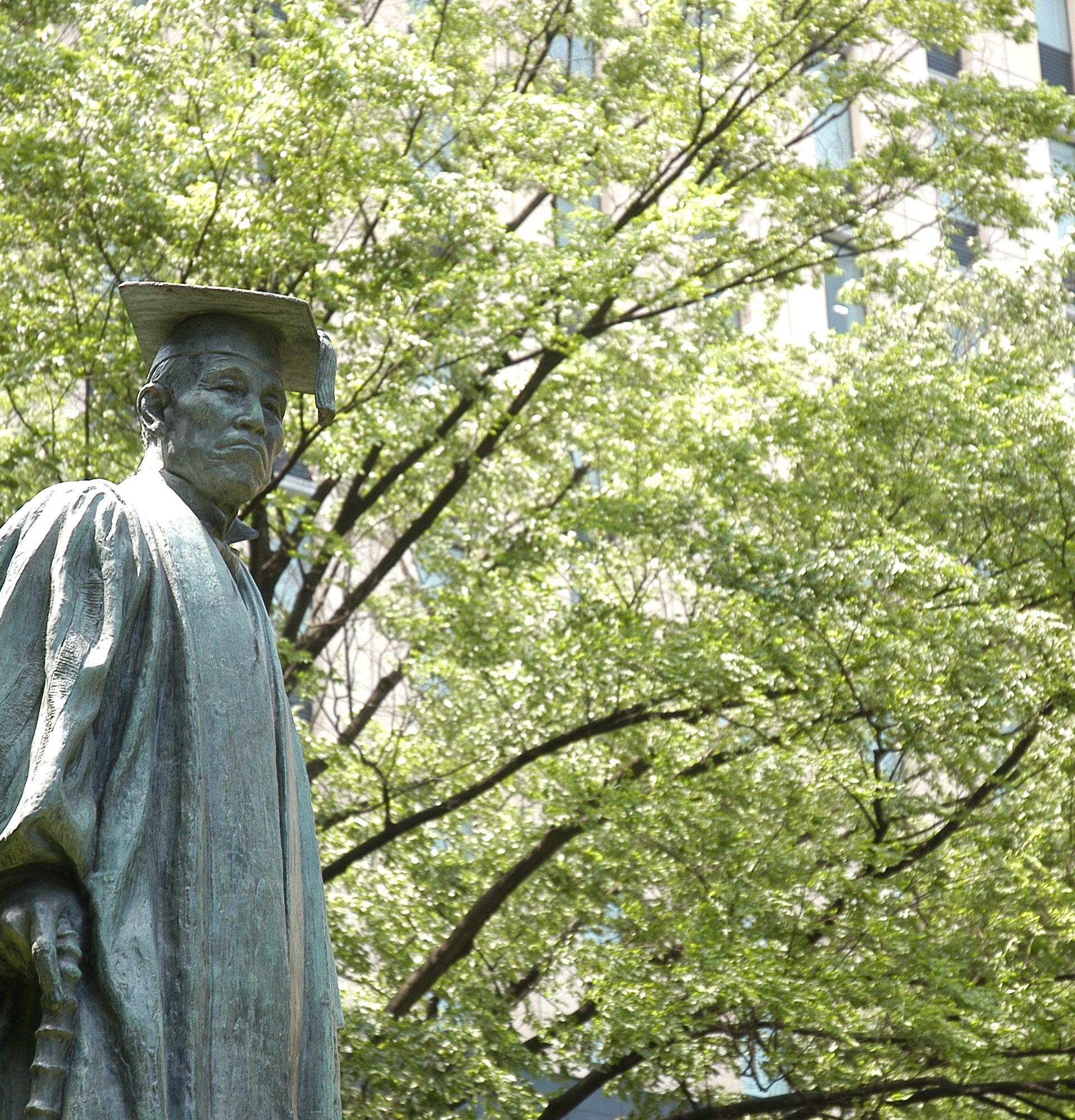

Alumni of the Japan Confederation of A- and H-bomb Sufferers Organizations spoke with President Tanaka
The Japan Confederation of A- and H-bomb Sufferers Organizations (Hidankyo) has been working to realize a world free of nuclear weapons and was awarded the Nobel Peace Prize in 2024. Representative Director Satoshi Tanaka and Assistant General Secretary Jiro Hamasumi are both Waseda University graduates. On April 15, they visited Waseda University and had a discussion with President Aiji Tanaka.
Mr. Tanaka was exposed to the atomic bombing of Hiroshima at the age of one. After graduating from Waseda University, he worked as a reporter and editorial writer in the news department of the Chugoku Shimbun newspaper, where he encountered Hidankyo. He was so impressed by their activities that he joined in 2006. He has served as a director of the Hiroshima Prefectural Hidankyo and secretary-general of the Liaison Council of Hiroshima Atomic Bomb Survivors Organizations, and has written books such as "The 50-Year History of the Japan Confederation of A- and H-Bomb Sufferers Confederations" and "The History of Administrative Relief for Atomic Bomb Survivors in Hiroshima City."
Jiro Hamasumi was exposed to the atomic bomb while he was in his mother's womb in Hiroshima. In 2003, he was involved in the establishment of the Inayukai, an association for atomic bomb survivors in Inagi City, Tokyo, and has served as its chairman since 2012. In 2015, he became Assistant General Secretary of the Japan Confederation of A- and H-Bomb Sufferers Organizations, and in 2019, he became the first person to be exposed to the atomic bomb in utero to give a speech at the United Nations Headquarters in New York.
During the meeting, the two men, who had both attended the Nobel Peace Prize ceremony, reported to President Tanaka about the event. They also donated materials related to Hidankyo and newspaper articles from the time of the Nobel Prize award, and explained the relationship between the Hidankyo and our university.
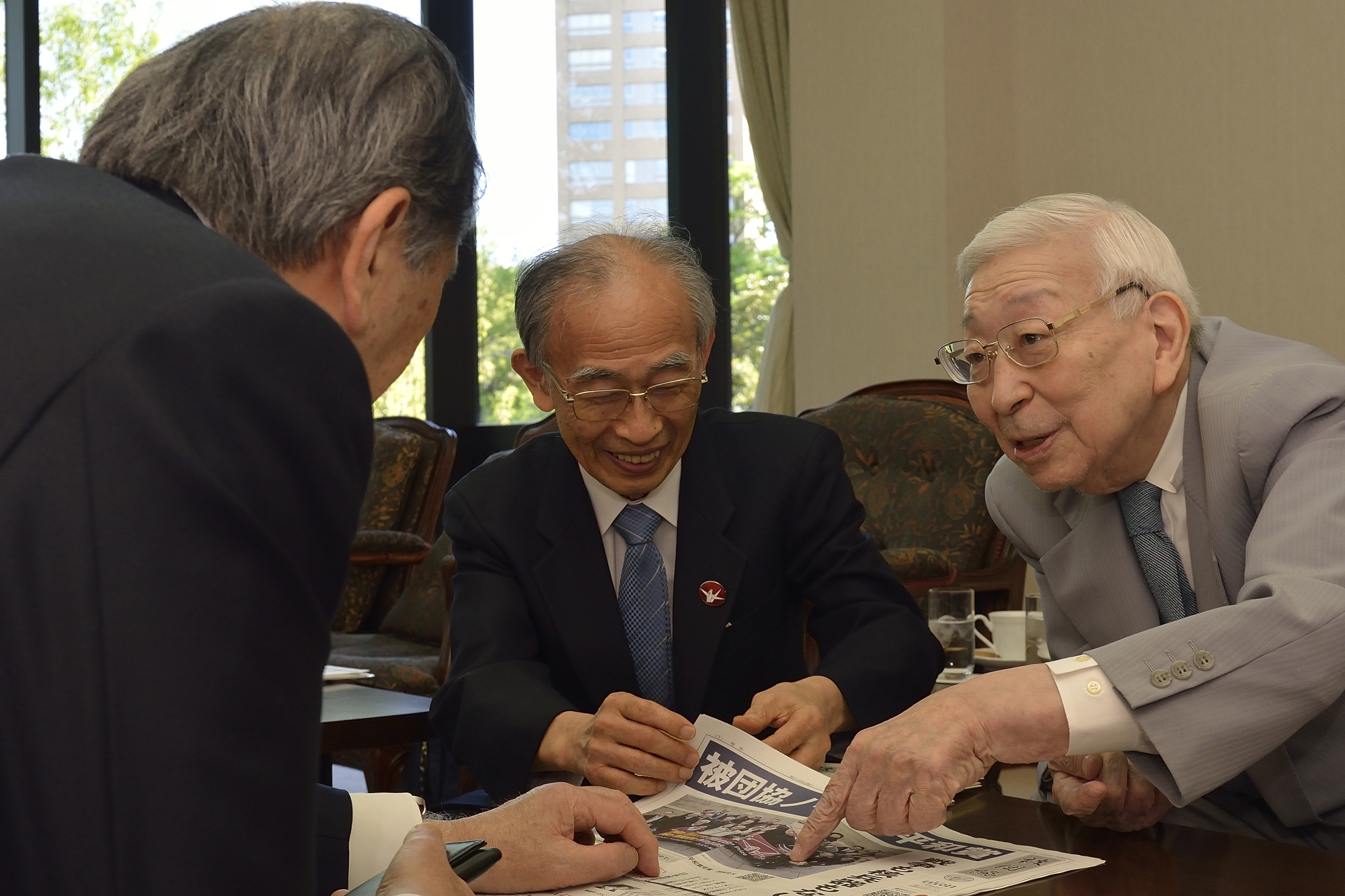
From the right: Mr. Satoshi Tanaka, Mr. Jiro Hamasumi, and President Aiji Tanaka
80 years since the end of the war: mobilizing the international community
In the evening, a celebration reception hosted by the President was held at the Rihga Royal Hotel Tokyo. The reception was a ceremony to honor the achievements of graduates who have been active in various fields in the academic year 2024. Guests included recipients of decorations, medals and other awards, company and organization representatives, and elected Diet members and local government heads. At this year's reception, Satoshi Tanaka and Jiro Hamasumi gave speeches on behalf of the guests.
Mr. Tanaka looked back on the Nobel Prize ceremony, along with his own war experiences.
"I was exposed to the atomic bomb when I was 1 year and 5 months old, and have since overcome six cancer surgeries to get to where I am today. The moment it was decided that I would receive the Nobel Prize, the first thing that came to my mind was the images of my predecessors. About 10 years after the bombing, my predecessors pledged to 'save ourselves and, through our experiences, save humanity from this crisis,' and founded the Japan Confederation of A- and H-Bomb Sufferers Organizations. At the forefront of this organization was Fujii Heiichi, who became its first Secretary General. I attended the award ceremony with a small portrait of Fujii in my pocket, and shared my experience."
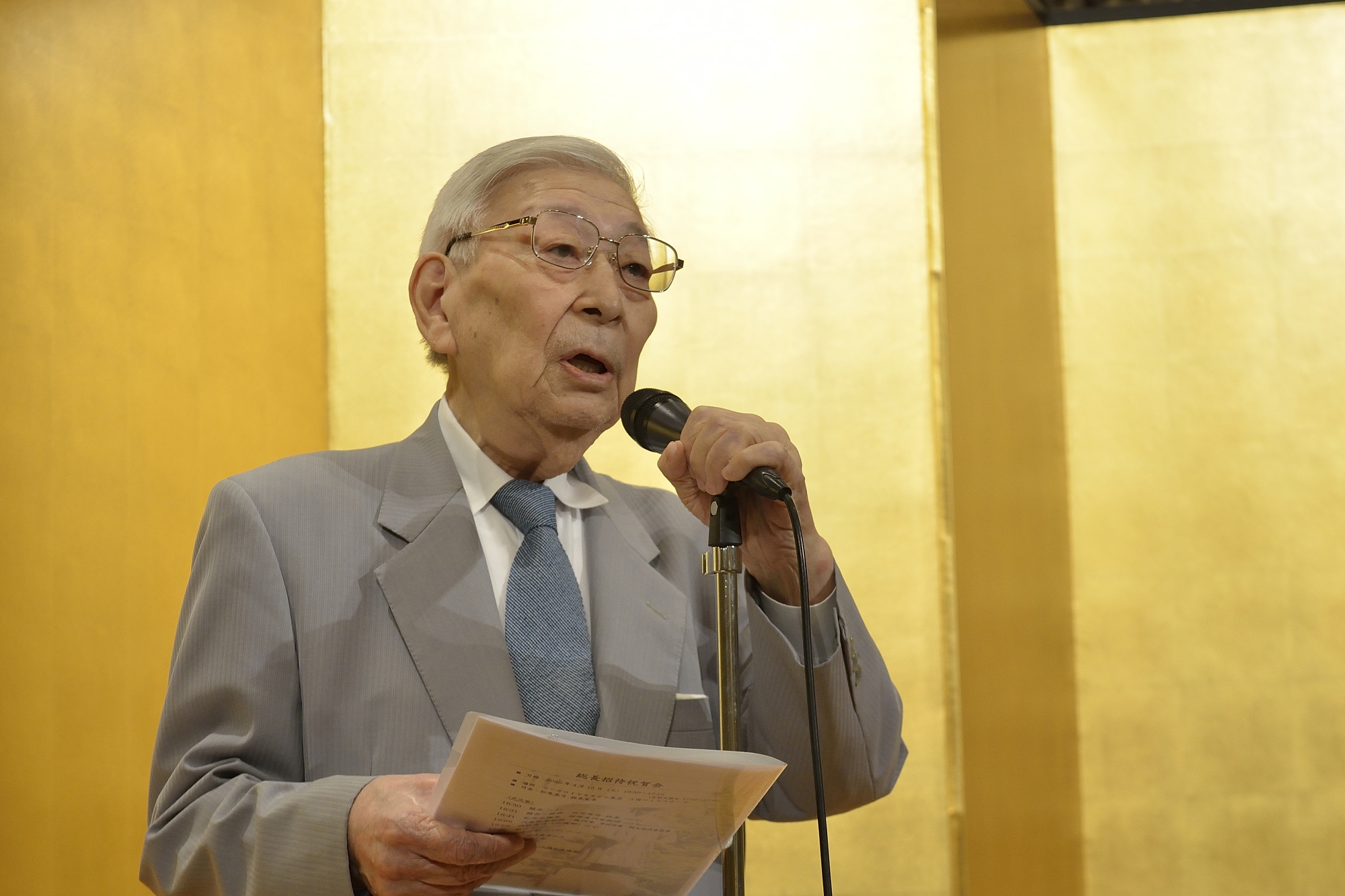
Mr. Satoshi Tanaka
Tanaka, who had a close relationship with Fujii, revealed that he realized that Waseda University had played a major role in the history of Hidankyo.
"Did you know that Mr. Fujii was a graduate of Waseda University? During the Cold War, when the activities of Hidankyo were facing strong opposition, Mr. Fujii struggled to find a venue for the Fourth World Conference Against Atomic and Hydrogen Bombs and approached then-President Ohama Nobumoto to see if it could be held at Waseda University. He appealed to President Ohama, who was from Okinawa, which was under American occupation at the time, that the atomic bombing survivors' movement was a humanism that transcended ideology and national borders, and Waseda Memorial Hall was lent to him as the venue. I will never forget the smile on Mr. Fujii's face as he recalled the joy he felt at that time. And the conference has continued uninterrupted to this day. I would like everyone to remember that Waseda University contributed to the continuation of peace activities, which led to the Nobel Peace Prize. I would like to express my sincere gratitude and appreciation for the opportunity to communicate and share my joy of receiving the award with everyone associated with Waseda University."
Mr. Tanaka also expressed his concerns about today's international society and emphasized his outlook for the future in his closing remarks.
"The Treaty on the Prohibition of Nuclear Weapons came into force in 2021, but the nuclear-weapon states, as well as the Japanese government, have turned their backs on ratification. At the same time, the risk of nuclear use has reached an extreme level, and it is not a situation in which to be happy. Today, 80 years after the end of the war, we have a mountain of challenges to overcome, such as ending war, for nuclear-weapon states to sit at the disarmament table, and passing on the experience of the atomic bombing to future generations. I would like to work with you all to the best of my ability so that the desire for humanism will permeate the Japanese people and the world, and grow into a force that moves international politics."
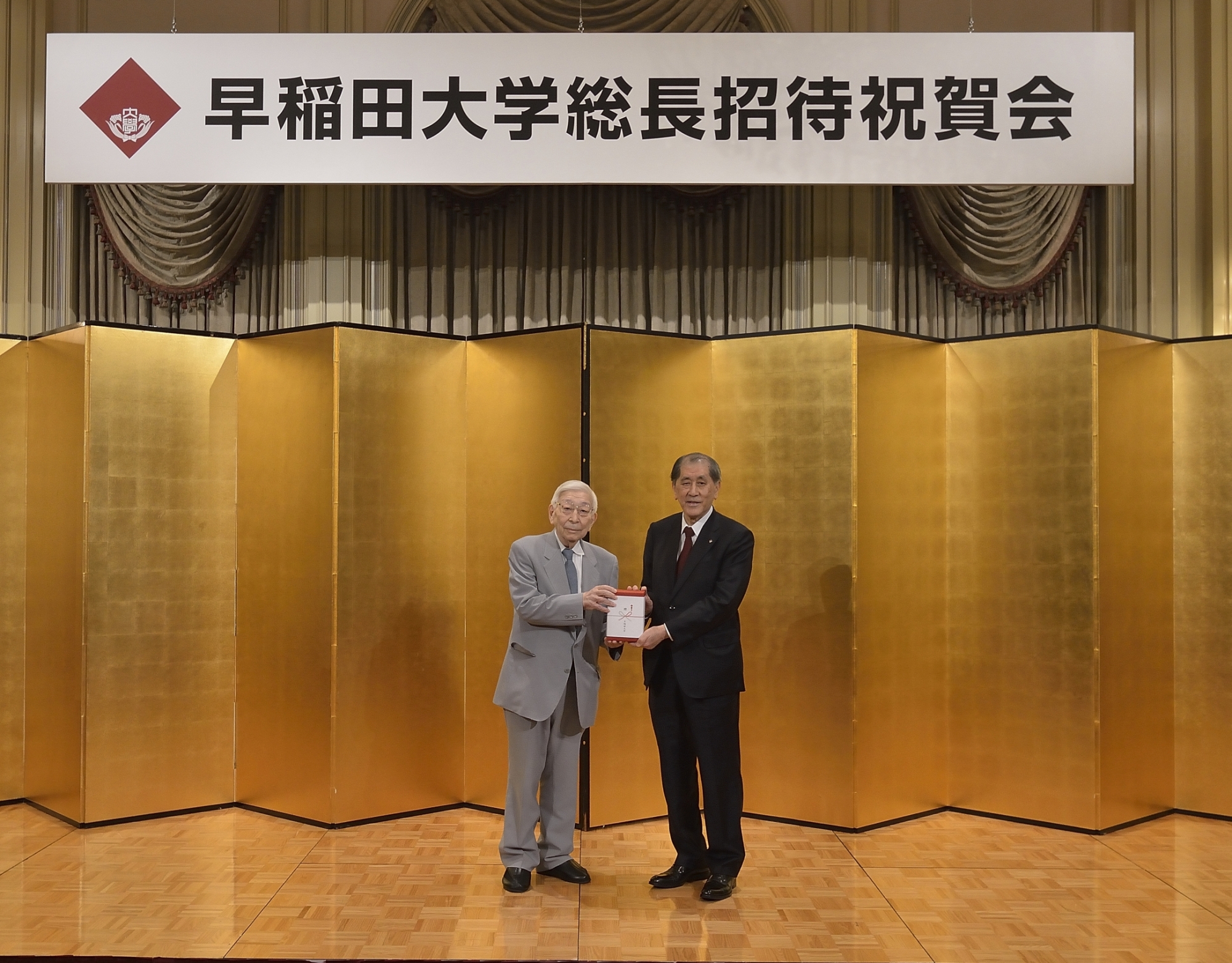
Hoping for a world where the next generation can continue to speak out
At the beginning of his speech, Jiro Hamasumi reiterated the reasons why he received the Nobel Peace Prize.
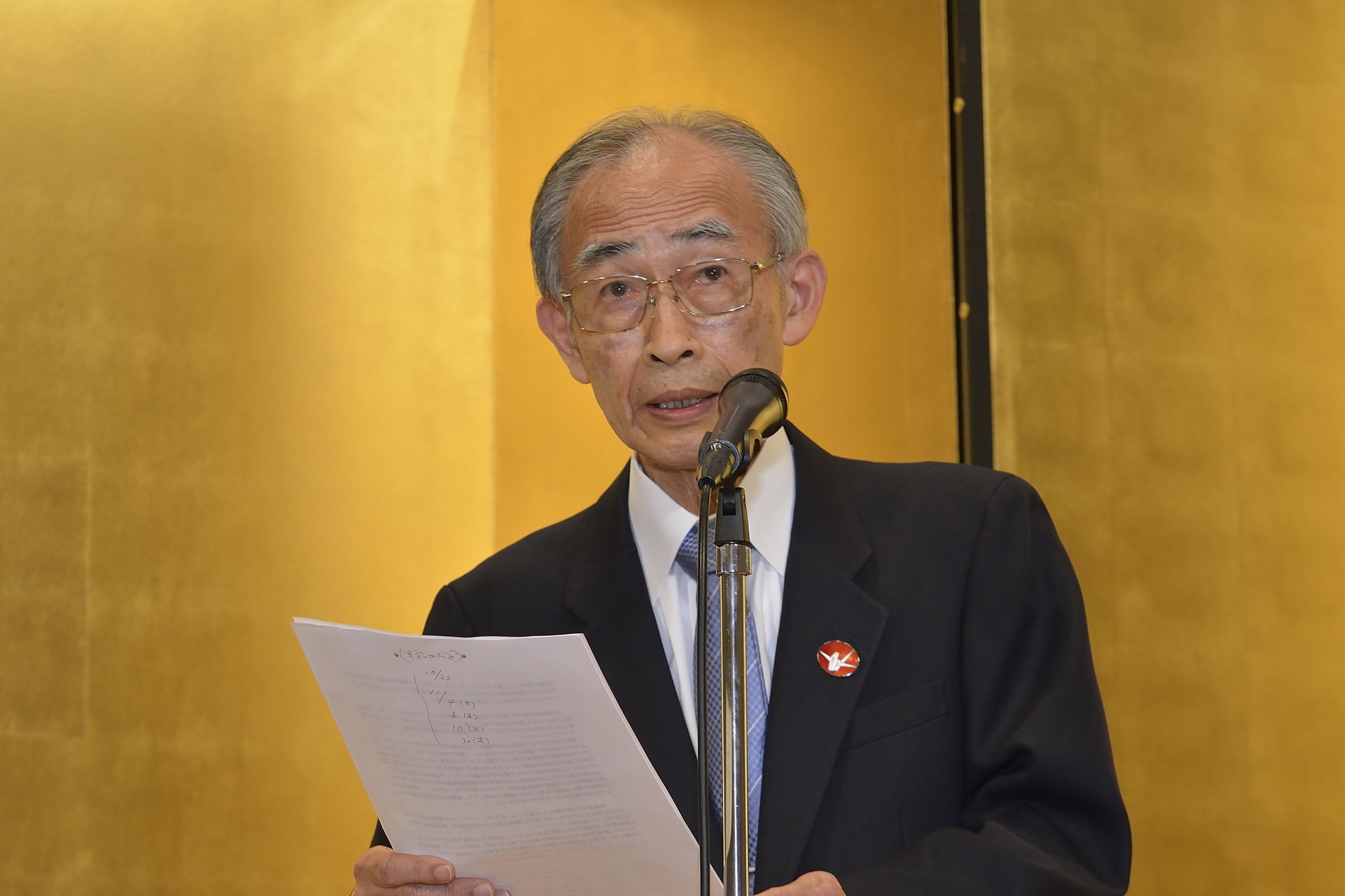
Jiro Hamasumi
"The reason that the Japan Confederation of A- and H-Bomb Sufferers Organizations received the Nobel Peace Prize is that we have demonstrated through our testimonies that nuclear weapons must never be used again. This has led to the formation of an international norm that the use of nuclear weapons is morally unacceptable, and has become ingrained as a 'nuclear taboo.' It also acknowledges the fact that nuclear weapons have not been used in war for nearly 80 years. However, today the nuclear taboo is under pressure, and nuclear weapons themselves have become far more destructive. The Nobel Committee has expressed the idea that it is now necessary to recall the experiences of the atomic bomb survivors who suffered from this damage."
Next, Mr. Hamasumi talked about his own experience of the atomic bombing and looked back on the journey from the founding of Hidankyo to the coming into force of the Treaty on the Prohibition of Nuclear Weapons.
"I was exposed to the atomic bomb while in my mother's womb at my parents' house, about four kilometers from the hypocenter in Hiroshima. My relatives evacuated on the day, but my father left for work early on the morning of the 6th and never returned. A young man who went to work in place of my pregnant mother lost his hair, and a three-year-old boy who was completely unharmed suddenly died about 20 days later. It is said that the number of casualties in Hiroshima and Nagasaki alone reached 210,000 in 1945. And for 11 years after the atomic bombing, the victims were left alone at a time when they needed help the most. In 1954, the nuclear tests at Bikini Atoll sparked a growing anti-atomic and hydrogen bomb movement, and in 1956 Hidankyo was formed. Hidankyo has campaigned on two basic demands: 'The damage caused by the atomic bomb must be compensated by the country that started and carried out the war' and 'Nuclear weapons are extremely inhumane weapons of mass destruction and must not be allowed to coexist with humanity and must be abolished immediately.' The adoption of a nuclear weapons ban treaty was our fervent wish."
It's been 80 years since the end of the war. As times change and new challenges arise, cooperation among more people is needed, Hamasumi said.
"The atomic bomb survivors will continue to speak out about the inhumanity of nuclear weapons through their testimonies. However, the average age of the survivors is now over 85, and the number of survivors, which peaked at 370,000, has now decreased to around 30%. The day will come when there are no more atomic bomb survivors. I hope that when that day comes, the younger generation, and people around the world, will continue to speak out for 'a world without war or nuclear weapons.' I would like to conclude my remarks with this hope. Thank you."
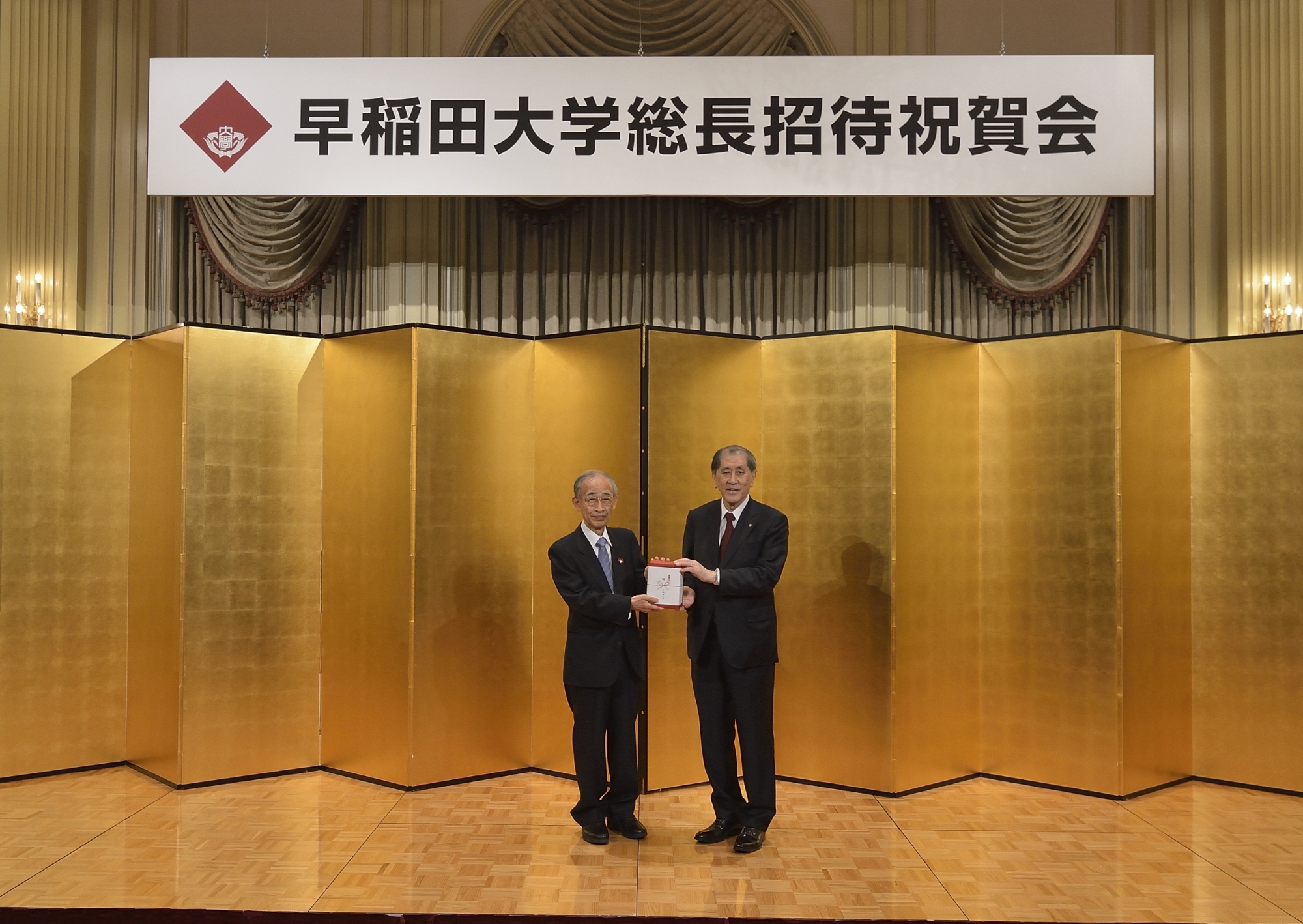
Photo by Rihga Royal Hotel Tokyo
Image gallery
